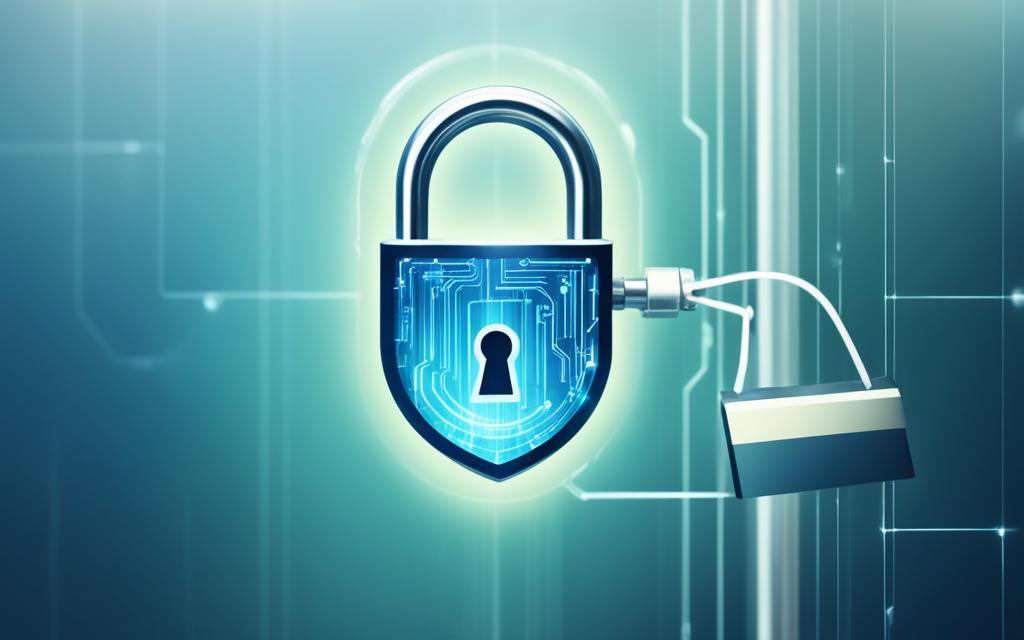Table of Contents
Blockchain offers many benefits over old ways of keeping records. It uses new technology like distributed ledgers and strong coding. This makes data safe and trustworthy. In the past, we often used one big database. This could hide things and let in bad actors.
Key Takeaways:
- Over 80% of blockchain solutions run on networks not controlled by one place. This makes them safer than the old way1..
- Blockchain keeps a record that no one can change. This helps keep data true and stops anyone messing with it1.
- It also lets deals be done quickly and with less cost1.
- Checks on transactions happen quickly, cutting down waiting times1.
- Bitcoin and others keep their networks open to all, while some others limit who can join1.
- Because transactions are checked quickly, things get done faster than with the old system1.
Global spending on Blockchain-based solutions could go from 3.7 billion in 2020 to 15.85 billion by 20242. This tech is safer than our old ways because it stops mistakes and hacks. Everyone can see the data safely, and it can’t be changed unfairly2. Some people still use old databases since they are cheaper at first and easy to grow. But, blockchain is better for trust and checking data. It can save money and limits the need for other companies’ checks2. Businesses can trust each other more because of this clear and safe way to share information3. There are advanced platforms, like FALKOR SI from ByzGen, that blend blockchain with a focus on helping our world3.
The Fundamental Differences Between Blockchain and Traditional Record-Keeping
Blockchain differs from common methods through its decentralized nature. It doesn’t need a central control. Instead, it works with a network of nodes for agreement and checking. This method brings more transparency, immutability, and better security.
One key point is how clear blockchain is. Every deal is seen and checked by many on the network. This clears the way for trust and knowing who’s responsible. It’s good for stopping fake products and proving real ones are genuine4.
Blockchain’s data is like a permanent marker. Once it’s written down, you can’t rub it out. This is because of special coded locks and keys that keep info safe. It makes a rock-solid system where no one can cheat the records5.
Security is where blockchain really shines. It’s been running for 13 years with no major security fails, unlike other big databases. Its way of spreading info around makes it hard for hackers to hit. Also, it needs a lot of power to be tampered with, which one person or group can’t easily do45.
Blockchain can also do smart contracts. These are digital pacts that run on their own. They cut out the middleman and make everything clear and fast. Using blockchain like this saves money on running and keeping data4.
Switching to blockchain tech can change how record-keeping works for the better. It focuses on sharing, making stuff unchangeable, and locking everything up safely. It marks a new chapter in keeping records right and safe.
Advantages of Blockchain Over Conventional Record-Keeping Solutions
Blockchain technology has changed how we handle and keep data. It brings many benefits over old ways. This includes better security, trust, quick transactions, and cost savings. Thus, it’s reshaping several sectors today.
One big plus of blockchain is its top-level security. It uses advanced encryption to keep records safe from fraud and hacks6.
Moreover, blockchain offers more transparency. Every transaction is stored the same way in many places. This lets everyone involved check the data at the same time6.
Also, blockchain makes it easy to follow any item’s journey. This builds trust and fights fraud in fields like supply chains6.
Additionally, blockchain makes work quicker and more efficient. It removes many steps by doing things digitally. This leads to speedier deals and less waiting6.
Using “smart contracts” means tasks can happen automatically. This cuts down on human errors and speeds up work6.
Many areas, like supply chains and finance, have seen big boosts from blockchain. They now enjoy clearer relationships, better efficiency, and safer sharing of information. Even government tasks and insurance have become more automated and cheaper6.
| Industries Benefiting from Blockchain Solutions | Advantages |
|---|---|
| Supply Chain and Food Chain | Enhanced trust between trading partners in supply chains |
| Banking and Financial Services | Operational efficiencies |
| Healthcare | Improved security and data sharing |
| Pharmaceuticals | Enhanced traceability |
| Government | Smart data sharing in operations |
| Insurance | Increased automation and cost reduction |
To sum up, blockchain tech brings a lot of good changes. It improves security, trust, speed, and costs, benefiting many industries6.

Disadvantages and Challenges of Implementing Blockchain Solutions
Blockchain technology offers many benefits. But, there are challenges in using it. These challenges can make its use difficult.
1. Scalability Issues and Increasing Computing Demands
As more transactions happen, the ledger gets bigger. This makes it hard for blockchain to grow. It needs all nodes to check and record transactions. This slows things down and needs a lot of computing power. So, finding ways to scale effectively is key for blockchain’s success7.
2. Integration Complexities and Compatibility Issues
Mixing blockchain with old systems can be tough. They might not work well together. Many have a hard time joining blockchain with usual ways of keeping records. Skilled people must help to do this right8.
3. Evolving Regulatory Landscape
The rules around blockchain are always changing. This makes things hard for businesses using it. They need to keep up with the law and make sure they follow it. Knowing and adjusting to the new rules is vital8.
4. Lack of Established Standards and Best Practices
There aren’t clear rules on how to best use blockchain. Most setups don’t have standard ways to do things. This makes it hard for businesses to know what to do, causing them to miss out on blockchain’s benefits8.
Companies should carefully look at the challenges blockchain brings. They need to find new ways to tackle these issues. By doing this, they can fully enjoy blockchain’s many advantages across different sectors.
Case Studies: Real-World Applications of Blockchain in Record-Keeping
Blockchain is changing how we keep records across many sectors. Real-life examples show its power in managing records better.
Finance: Accelerating Processes and Enhancing Security
Finance is seeing big changes with blockchain. The market for this tech hit $17.46 billion in 2023. It’s expected to grow by 87.7% each year from 2023 to 20309. Blockchain makes transactions faster and safer for everyone. It helps financial firms cut costs and keep data safe. This tech also keeps records clear and secure, protecting deals.
Identity Management: Secure Validation of Personal Data
Blockchain boosts how we manage our personal info. It gives us control over our digital details via secure networks. Tools like Akiri and Factom keep our data safe from thieves9.
Supply Chain: Tracing and Ensuring Transparency
Blockchain adds a new level of trust in supply chains. Companies use tech like OriginTrail to follow products from start to finish. In food, consumers can track the journey of their meals thanks to OriginTrail10. De Beers also uses blockchain to stop conflict diamonds, ensuring gems are sourced ethically10.
Healthcare: Secure and Efficient Data Management
Healthcare is making the most of blockchain for keeping data safe. This tech cuts health costs and makes info easier to get. Estonia uses blockchain to join up health services, making care more accessible. Platforms like MedicalChain help keep health records secure, even for remote doctor visits10.
Government: Secure and Transparent Record Management
Blockchain is taking off in the public sector for secure records. It’s used for land records and election data, making systems better. The logistics industry in the U.S. is learning from this. By going blockchain, they aim to save big money yearly by being more open and doing things smarter9.
Education: Verifying Records and Protecting Intellectual Property
In education, blockchain checks students’ payments and protects ideas. It makes sure certificates are real, easing checks for jobs or more study. It’s also good for handling digital book deals, keeping these deals clear and fair11. It even lets schools pay for things easily across borders, cutting down on money change costs11.
Blockchain is shaking up how we keep records in many areas. It’s making finance, ID checks, supply chains, health, governments, and schools work better. By keeping data safe and clear, blockchain’s leading to new, more efficient ways of doing things. As we learn more about what blockchain can do, it’s clear it will keep changing how we handle records in the future.
The Future of Record-Keeping: Blockchain vs. Conventional Methods
Experts see a big rise in using blockchain for record-keeping. It has lots of advantages over old ways12. For example, it updates data in real time and improves security12. Also, it works faster because of its design12.
One big plus of blockchain is it cuts down on storage costs12. Its unique way of storing data makes it safer and less likely to lose information12. And, it’s hard for anyone to change data dishonestly because of its setup12.
When we compare blockchain to old ways, it clearly changes the game12. Old systems need go-betweens; blockchain doesn’t, making it more free, safe, and open12. Using both blockchain and traditional methods together could be key. It might create an even better way to keep records12.
Blockchain doesn’t just shake up record-keeping. It’s changing many industries by being safer and smarter12. This new tech is helping businesses handle digital deals and store data better12.
Looking ahead, more and more people will start using blockchain for record-keeping12. It offers better updates, works efficiently, and is more secure12. Combining it with traditional methods might open doors to great new ways of managing data12.
Immutability
Immutability is a key feature of blockchain. It keeps data safe and true, unlike normal databases. With blockchain, once data is in, it cannot be changed, ensuring security. This is thanks to special ways of protecting the data.
When a new piece of data is added, all computers on the network check and approve it. They then link it to older data using complex codes. This creates an unbreakable chain of information. It means no one can change the info without everyone else knowing, making the system secure.
“Blockchain is designed to keep data unchanged. This stops anyone from tampering with it, which prevents cheating and lies.”13
Blockchain is made to be super safe. It’s perfect for areas like money, goods tracking, and medical files. It keeps everything clear and honest.
Blockchains also offer extra protection. Once data is in, it’s there forever. This stops any sneaky changes from being made without people noticing.
“Blockchain’s safety features make it great for keeping out lies and cheats.”13
With old databases, someone could secretly change or delete information. But with blockchain, everyone keeps watch. This stops bad things from happening and makes information more reliable.
The idea of staying the same is a big part of blockchain. It uses really smart maths to make sure data doesn’t change. This keeps the whole system safe and honest.
Plus, blockchain uses a lot of clever tools to make sure info is always right. These tools work together to lock the data in place, making it super secure.
Blockchain’s safety helps in many areas. It makes things safer, cheaper, and easier to understand. This is great news for lots of businesses and people.
But keeping everything safe in blockchain has its own problems. Things like growing big enough, using too much power, and working with others can be hard. But many smart people are working to fix these issues for the future.
Advantages of Blockchain’s Immutability
| Advantages | Description |
|---|---|
| Prevents Fraud and Unauthorized Activity | Blockchain’s unchangeable nature blocks fraud and stops anyone from playing tricks with the data. |
| Enhances Security | Being unchangeable makes blockchain a very safe place for data, ensuring it stays as it should. |
| Increases Trust and Transparency | Its unalterable records help build trust by showing everyone the true story behind every transaction. |
| Enables Traceability | By recording everything, blockchain easily tracks where things come from and how they have moved. |
Immutability is the rock on which blockchain stands. It fights fraud, keeps data safe, and makes it easier to believe in what we share. As we make blockchain better, its ability to stay unchanged brings new chances and persuades more people to use it.
Note: The provided image visually highlights the concept of immutability in blockchain.
Decentralization
Decentralization is crucial for blockchain tech. It’s different from the usual systems. Instead of one central server, it spreads control across many nodes in a network.
Each node in this network has a copy of all data. This stops any failure point. So, blockchain is very reliable and stable14.
Decentralization boosts security and honesty. In usual, one has full control. But with blockchain, data is super safe from tampering and attacks14. The information on a blockchain is hidden and linked to other blocks. This stops bad actors from changing data, which is key in keeping data safe.
Also, blockchain’s setup makes tracking easier than normal. In the past, checking where something comes from or if it’s true can be hard. But blockchain shows every step clearly and safely, so everything is traceable14.
Decentralization also helps transactions work smoother. Typically, we need go-betweens to run transactions. But with blockchain, these middlemen are not needed. It makes transactions quicker and simpler for everyone involved14.
Using blockchain can save a lot of money for companies. It cuts out the need for middlemen and lessens manual work. This makes processes faster and cheaper14. Blockchain can also grow with a company, flexing as it grows. This makes adapting to changes simpler.
Blockchain’s decentralization changes how we keep records. It makes them safer, clearer, and more efficient than ever before. As more businesses use blockchain, its benefits will become clearer in making the future of record-keeping better than we’ve known.
Enhanced Security and Greater Transparency
Blockchain tech brings key benefits over old record-keeping ways. It boosts data security and offers more transparency. This helps organisations keep sensitive info safe and build trust in their network.
Data on the blockchain is safe because it’s hidden. Only the right people can see it. This keeps private info private and deals with worries about hacks and other privacy issues15.
With blockchain, everyone with special access can see all the data. No go-betweens are needed. This lets people trust the facts they see. It also stops lies and cheats, making things fair15.
This tech is making big changes in many areas by making data security better and being honest about info. For instance, in Sweden, using blockchain cut the time to do property deals a lot. This made things work faster and safer16. In Brazil, making certificates with blockchain made them more right. This saved money too16. In West Virginia, USA, using blockchain helped soldiers vote easier. This showed how it can make voting better and more trusted16.
But, there are still big problems to solve with blockchain. It’s hard to use it a lot because it doesn’t get bigger easily. Yet, smart people are working on fixing this. They’re looking at new ways to make it work better16.
Also, making different blockchain systems work together is tricky. Because not all systems talk the same language. Big groups are trying to make them understand each other better but it’s taking time16.
| Statistical Data | Key Insights |
|---|---|
| Global spending on AML/KYC data and services is forecasted to reach $1.6 billion in 2022. | More focus on stopping money crimes and checking the rules means we need more AML/KYC stuff17. |
| People stealing identities makes the world lose lots of money each year. | This problem shows why we need super strong ways to keep our info safe17. |
| In 2020, over 1 million children were hit by identity fraud. | This underlines how crucial it is to protect private info, especially to keep children safe17. |
| 87% of people have left personal details out there while checking emails or banking online. | This shows we must do more to keep personal info off the web, to protect people’s privacy17. |
| Almost a billion folk can’t prove who they are. | This stops them getting things they need, like bank accounts. We must find ways to help17. |
| About 1.7 billion grown-ups don’t use banks around the world. | This shows how much blockchain could help more people use banks and money easily17. |
| In 2021, cheating with government help was the top kind of ID theft, just after card fraud. | This means we have to be really sharp to stop people tricking the system17. |
| Almost all the hacking stuff is about stealing personal info (97%). | Looking after this info is key to keeping people’s lives private and stopping bad things17. |
Conclusion
Blockchain technology has many benefits over old ways of keeping records. It’s decentralised, which means it’s safer and more trusted. Every transaction in a blockchain is hidden, keeping it safe and private18.
This technology can’t be changed once it’s recorded, so it’s reliable18. With everything out in the open, fraud is much harder to get away with18.
Blockchain uses new methods, like Proof of Work or Proof of Stake, to make transactions safe18. Smart contracts also help make things faster and more efficient18. But, making it work well with different systems can be tough18.
It checks things in real time, which is quicker than before18. Storing data in many places makes it safer from being lost18. There’s a good balance between keeping things private and being open, which is special to blockchain18.
There’s no need for other people getting involved, which saves money and stops fraud18. The design itself fights off fraud, thanks to the way the system is built18.
Blockchain could change how we handle money and data in a big way18. It’s changing the game with its unique abilities to keep data safe and use smart contracts18. As more businesses start using blockchain, it’s raising the bar for how we manage and keep data safe18.
FAQ
What are the advantages of blockchain over traditional record-keeping?
Blockchains improve the safety and accuracy of data. They set a new, better standard for how records should be kept.
What are the fundamental differences between blockchain and traditional record-keeping?
Blockchains work in a way that’s open and decentralised. This makes it harder for information to change or be accessed by the wrong people. Compared to traditional ways, blockchains are more secure and clear.
What advantages does blockchain offer over conventional record-keeping solutions?
Blockchains give better safety, trust, and faster handling of records. They also cost less, and make it harder for errors or cheats to happen.
What are the challenges of implementing blockchain solutions?
Using blockchains can be hard when lots of people are online, or if the rules change. It’s also tough because there are no fully agreed ways to do things yet.
How is blockchain technology applied in real-world record-keeping?
Blockchains are being used in many areas, like money, verifying people’s identities, making sure products are really what they claim, and in health, government, and schools.
What is the future of record-keeping, and how does blockchain fit into it?
In the future, we might use both blockchains and old ways, mixing their best parts. This could make keeping records even better.
What is the immutability of blockchain?
Once data is put in a blockchain, it can never change. This makes blockchains very secure against people trying to mess with the information.
How does decentralization differentiate blockchain from traditional systems?
Blockchains aren’t controlled by just one person or group. They spread out the control and info, making it safer and more dependable.
What security and transparency benefits does blockchain provide?
Blockchains keep data safe and hidden from those who shouldn’t see it. At the same time, everyone can check what’s in the records. This stops cheating and tricks.
What is the conclusion about the advantages of blockchain in record-keeping?
Blockchains bring big wins, making records more reliable, safe, fast, and clear. They change how we keep records, for the better, than ever before.
Source Links
- https://medium.com/@BlockchainReporter/what-sets-blockchain-solutions-apart-from-conventional-record-keeping-solutions-c0b19be11d09 – What Sets Blockchain Solutions Apart from Conventional Record-Keeping Solutions?
- https://www.theknowledgeacademy.com/blog/what-sets-blockchain-solutions-apart-from-conventional-record-keeping-solutions/ – What Sets Blockchain Solutions Apart From Conventional Record-Keeping?
- https://www.byzgen.com/insights/what-sets-blockchain-solutions-apart-from-other-record-keeping-solutions – Blockchain versus conventional record keeping solutions
- https://www.cryptobunq.com/blog/conventional-vs-blockchain-solutions – Blog: Record-Keeping: Conventional vs. Blockchain Solutions
- https://coredevsltd.com/articles/what-sets-blockchain-solutions-apart-from-conventional-record-keeping-solutions/ – What Sets Blockchain Solutions Apart From Conventional Record-Keeping Solutions?
- https://www.ibm.com/topics/benefits-of-blockchain – What are the Benefits of Blockchain? | IBM
- https://www.appmaisters.com/blockchain-solutions-apart-from-conventional-record-keeping/ – Blockchain Solution: What Sets Them Apart from Conventional Soln
- https://coin360.com/news/blockchain-vs-conventional-record-keeping – Blockchain vs Conventional Record-Keeping: A Comparison
- https://ideausher.com/blog/blockchain-applications/ – Real-World Use Cases Of Blockchain Technology – IdeaUsher
- https://www.forbes.com/sites/bernardmarr/2018/05/14/30-real-examples-of-blockchain-technology-in-practice/ – 30+ Real Examples Of Blockchain Technology In Practice
- https://journals.ala.org/index.php/ltr/article/view/7187/9796 – Chapter 3: Case Studies and Thought Starters | Meth
- https://cryptonews.net/news/blockchain/21134091/ – What Sets Blockchain Solutions Apart from Conventional Record-Keeping Solutions?
- https://www.indusnet.co.in/blockchain/ – Blockchain Development
- https://visionary-finance.com/what-sets-blockchain-solutions-apart-from-conventional-record-keeping-solutions/ – What Sets Blockchain Solutions Apart from Conventional Record-Keeping Solutions? – Visionary Financial
- https://www.questglt.com/blogs/what-diffrentiates-blockchain-solutions-from-conventional-record-keepimg-methods – What Differentiates Blockchain Solutions from Conventional Record-Keeping Methods?
- https://www.linkedin.com/pulse/blockchain-public-sector-transparency-liveplexplatform-r7ryc – BLOCKCHAIN FOR PUBLIC SECTOR TRANSPARENCY
- https://www.dock.io/post/blockchain-identity-management – Blockchain Identity Management: Complete Guide 2024
- https://blockchainreporter.net/what-sets-blockchain-solutions-apart-from-conventional-record-keeping-solutions/ – What Sets Blockchain Solutions Apart from Conventional Record-Keeping Solutions?












